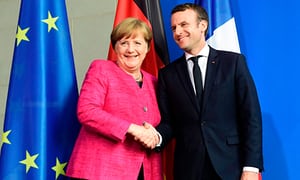Though Mr. Macron envisions a budget in the region of several percent of GDP, Mrs. Merkel is known to want something much stingier.
雖然,馬克龍的設想預算在幾個GDP百分比左右,但是默克爾想要的預算范圍更窄。
Nevertheless, as Mr. Macron says, it would be a "real budget with annual revenues".
然而,如馬克龍所說,真正的預算將和年收入相關。
He would like to see it raise revenues directly, possibly from a financial transactions tax, though that would be contentious.
他想看到稅收的直接增加,該稅收可能來自金融交易稅,雖然這樣會引起爭議。
Most of the money would be invested in innovation, helping economic convergence.
大部分資金將被投入創新之中,幫助經濟收斂。
There is a mention, too, of an unemployment-stabilisation fund to act as an emergency credit line for national unemployment-insurance schemes.
還需提到失業穩定基金,該基金充當國家失業保險項目的緊急信用額度。

But such a design, which accords with German nervousness about fiscal transfers, might not be enough in deep downturns.
該計劃與德國對于財政轉移不安的緊張相一樣,但是該計劃不足以應對經濟深陷低迷時期。
Mr. Macron and Mrs. Merkel may finally agree on the merits of a central budget. But others must now be convinced.
馬克龍和默克爾或許最終會就中央財政預算的優勢取得一致意見。但現在必須讓其他方信服。
Mrs. Merkel's coalition partner, the Christian Social Union, has expressed scepticism.
默克爾的聯合伙伴,基督教社會聯盟,對此表示懷疑。
The Dutch prime minister, Mark Rutte, has said he sees little point in it if countries keep their public finances in order.
荷蘭首相馬克·呂特表示,如果各成員國保持其公共財政狀況良好,該提議也就沒有什么意義了。
Yet even a well-maintained roof may spring a leak.
然而即便是一個維護完善的房頂也會出現漏洞。
譯文由可可原創,僅供學習交流使用,未經許可請勿轉載。












